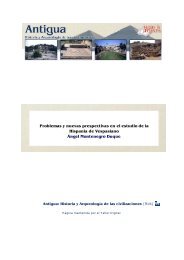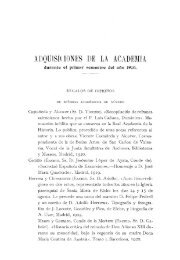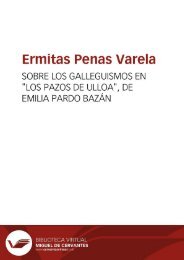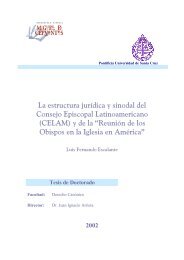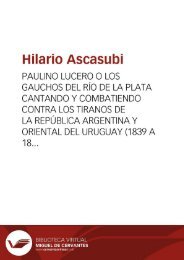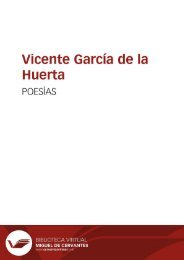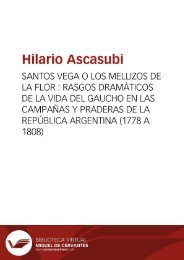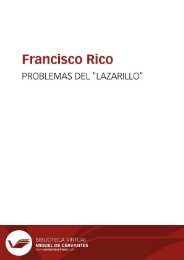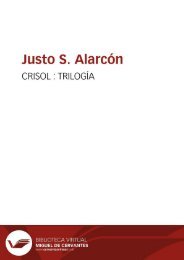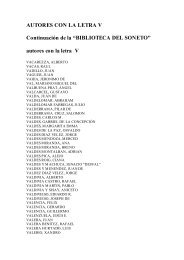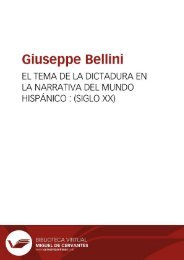Create successful ePaper yourself
Turn your PDF publications into a flip-book with our unique Google optimized e-Paper software.
Anales galdosianos [Publicaciones periódicas]. Año XII, 1977<br />
Ángel's political disillusionment and the subsequent deaths of his mother and daughter throw him<br />
into crisis. Having lost his political cause and the objects of his filial rebellion and paternal love, he<br />
finds himself completely disoriented: « Con el tiempo la soledad aumentaba, pues cada día hallábase<br />
Guerra más agobiado y triste, y con la soledad, iba tomando cuerpo la idea de que su vida no tenía ya<br />
ningún objeto » (1278). Two new preoccupations then fill this void, his recently inherited fortune<br />
and Leré. Ángel perceives the change effected by his affluence (« yo he sido un poco socialista;<br />
pero, francamente, eso me pasaba cuando no tenía dinero. El reparto de la riqueza me parecía muy<br />
bien cuando a mí nada podía sobrarme » [1285]), but, particularly because he refuses to reflect<br />
on it, the source of Leré's influence remains mysterious. Nevertheless we can find certain apparent<br />
psychological causes for it, for she seems to become a substitute for both his mother and his daughter:<br />
she is strong-willed like Doña Sales, and treats Ángel rather like a child, and he continually associates<br />
her with Ción. 226<br />
Aside from these possible motivations, Ángel is attracted to Leré because he sees in her an idealism<br />
similar to his own in its fervor if not in its content, and he recognizes the attraction that her strong<br />
religious convictions exercise: « tu santidad [la de Leré] me cautiva, y si no fueras como eres, si<br />
no tuvieras esa fe a toda prueba y esa vocación irresistible, se me figura que me gustarías menos.<br />
He pensado mucho en esto, pero mucho. 'Si me quisiera ella a mí como yo a ella... se vulgarizaría, y<br />
entonces, perdido el encanto y deshecha la ilusión, no valdría para mí lo que vale y no me cautivaría<br />
tanto' » (1293). Although Leré does not stand in revolutionary opposition to the status quo, her<br />
position is clearly distinct from the banality that Guerra feels is characteristic of the bourgeois norm.<br />
These characteristics make Leré an appropriate mediator of his new situation since by emulating her,<br />
he must only renounce his revolutionary pretensions (which were becoming uncomfortable anyway)<br />
and not his dedication to ideals or his desire to remain independent of the bourgeois norm. As was the<br />
case with his political activity, Ángel's religious fervor is psychologically motivated; his « exaltación<br />
humanitaria » (1269) has turned into an « exaltación religiosa ».<br />
mock the vain heroics of Guerra, at the same time that he details his suffering» (Monroe Z. Hafter, «<br />
Bálsamo contra Bálsamo » in Ángel Guerra , AG , 4 [1969], 39-48, p. 39).<br />
226 Sherman Eoff ( The Novels of Pérez <strong>Galdós</strong> [St Louis: Washington University, 1954]) notes that<br />
Ángel «finds in the strong-willed and orderly Leré what he did not find in Dulcenombre: a substitute<br />
for his mother; and he transfers to her both his ingrained submissiveness and his longing for sympathy<br />
and understanding» (p. 76).<br />
166




